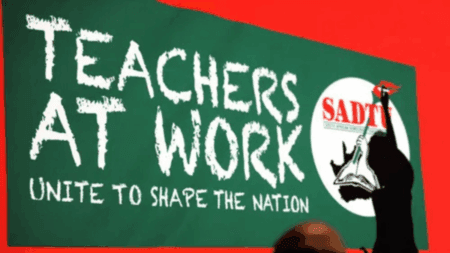The South African National Defence Force (SANDF) is responsible for safeguarding the country’s sovereignty and its people. Every year, young South Africans are given the opportunity to apply to join the ranks of the SANDF. The intake process is usually met with great anticipation, but in 2024, many applicants are facing frustration and confusion due to a prolonged feedback blackout.
Thousands of applicants, many from rural and disadvantaged communities, are still waiting for updates regarding their application status. This situation has left many asking questions about the causes of the blackout, the potential solutions, and what steps to take next.
In this article, we explore the reasons behind the feedback blackout, possible solutions, and guidance for applicants navigating this challenging situation.
What Is the SANDF Intake Process?
The SANDF annual intake process is designed to recruit young South Africans for various roles in the military, including the army, navy, air force, and medical services. The recruitment drive is highly competitive, and applicants undergo a rigorous selection process that includes:
- Initial Application Submission: Applicants submit their forms and required documents.
- Screening and Shortlisting: The SANDF screens the applications to determine which candidates meet the basic requirements.
- Psychometric Testing and Interviews: Shortlisted candidates are invited to undergo a series of tests, including fitness assessments and psychometric evaluations.
- Medical Examinations: Successful candidates are subject to medical screenings to ensure they are fit to serve.
- Final Selection: Based on the results of the tests and evaluations, a final selection of candidates is made.
In previous years, the process was fairly streamlined, and candidates were typically informed of their status within a few months. However, the 2024 intake has been plagued by an extended silence, leaving many applicants anxious and uncertain.
Causes of the Feedback Blackout
Several factors have contributed to the current communication breakdown between the SANDF and applicants. Here are some of the key reasons for the delay:
1. Administrative Challenges
One of the most significant causes of the feedback blackout is administrative bottlenecks within the SANDF’s recruitment system. With thousands of applications to process, the internal capacity of the SANDF may have been overwhelmed, leading to delays in sorting through applications, conducting tests, and issuing responses.
2. Budgetary Constraints
The SANDF, like many government departments, is subject to budgetary limitations. In recent years, financial constraints have impacted various aspects of its operations, including recruitment. These budget cuts may have led to a reduction in resources allocated to processing applications, conducting tests, and communicating with applicants.
3. COVID-19 Aftermath
Although the worst of the COVID-19 pandemic is behind us, its lingering effects on government operations continue to be felt. The SANDF recruitment process was disrupted during the pandemic, and it is possible that the 2024 intake has been affected by backlogs and delays carried over from previous years.
4. Technical Issues
There have also been reports of technical problems affecting SANDF’s communication systems. Whether it is outdated software or network issues, such challenges can prevent timely updates and feedback from reaching applicants. This is especially concerning for those living in rural areas with limited access to technology.
5. High Volume of Applications
The SANDF remains a popular career choice for many young South Africans, particularly from disadvantaged backgrounds, due to its offer of stable employment, education, and training. The sheer number of applications could be another factor in the delay. With thousands of hopeful applicants, it is possible that the SANDF is struggling to handle the large volume of inquiries and applications.
Impact on Applicants
The extended feedback blackout has left many applicants feeling frustrated, confused, and even discouraged. For those from disadvantaged backgrounds, this situation is especially challenging. Many have invested time, energy, and hope in the application process, and the lack of communication has created uncertainty regarding their future.
Some of the key impacts on applicants include:
- Uncertainty: Many applicants are unsure whether their applications were even received or if they are still being considered.
- Lost Opportunities: Some candidates have turned down other job or study opportunities in anticipation of hearing back from the SANDF, leaving them in limbo.
- Financial Strain: Some applicants, especially those from rural areas, have spent money on travel and documentation, and the prolonged wait has added to their financial burden.
- Emotional Stress: The anxiety and stress caused by the uncertainty can take a toll on applicants’ mental health, particularly for those from disadvantaged communities who see the SANDF as a way to lift themselves out of poverty.
Learn more: Former SAPS Officers Recruitment Drive – Here’s What They Could Earn
Possible Solutions
While the causes of the feedback blackout are varied, there are several potential solutions that could help alleviate the situation. These include:
1. Improved Communication Channels
The SANDF could introduce better communication platforms, such as a dedicated applicant portal or an SMS system, where candidates can check their application status. This would provide applicants with real-time updates and reduce the anxiety caused by the silence.
2. Increased Staffing
If administrative bottlenecks are contributing to the delay, the SANDF could consider increasing the number of staff dedicated to processing applications. This could help speed up the intake process and ensure that feedback is issued in a timely manner.
3. Budget Reallocation
The government could look into reallocating budgetary resources to ensure that the SANDF’s recruitment process is adequately funded. Given the importance of the military in national security, it may be worth prioritizing funding for the intake process to avoid future delays.
4. Outsourcing Certain Tasks
To ease the burden on its internal resources, the SANDF could explore the possibility of outsourcing some of its recruitment tasks, such as administrative processing or communication management, to third-party service providers. This would free up resources for the more critical aspects of recruitment.
5. Public Updates
The SANDF could also issue public updates through media channels to keep applicants informed about the progress of the intake process. This could be done via radio, TV, and social media platforms, particularly in regions where internet access is limited.
What Applicants Should Do Next
For applicants affected by the 2024 intake feedback blackout, it’s important to remain patient but proactive. Here are some steps you can take:
1. Keep Checking for Updates
Stay updated by checking the SANDF’s official website and social media platforms for any announcements regarding the 2024 intake. Some applicants have reported receiving updates via SMS, so make sure your contact details are up to date.
2. Reach Out to SANDF
If you haven’t heard back, try contacting the SANDF recruitment office directly. While you may not receive immediate feedback, it’s important to express your concern and request clarity on the status of your application.
3. Explore Other Opportunities
While waiting for feedback from the SANDF, consider exploring other opportunities in education, employment, or training. Don’t put all your eggs in one basket. Pursuing other options will give you a backup plan in case the SANDF application does not work out.
4. Stay Positive and Prepared
In the meantime, focus on improving your physical fitness and mental preparedness in case you are called for testing or interviews. Staying physically active and maintaining a positive mindset will help you be ready when the time comes
Tip: Unfair Working Conditions? Here’s How to File a Report
The 2024 SANDF intake feedback blackout has caused frustration and uncertainty for thousands of young South Africans hoping to serve their country. While there are multiple factors contributing to the delay, there are also several possible solutions that could be implemented to resolve the situation. For now, applicants are encouraged to remain patient, stay informed, and keep exploring other opportunities while awaiting feedback.
The SANDF remains a prestigious and important institution in South Africa, and despite the current challenges, many hopefuls are still eager to join its ranks. By addressing the causes of the blackout and implementing the necessary solutions, the SANDF can restore confidence in its recruitment process and ensure that future applicants do not face the same obstacles.






